We are building the national armed forces
Szöveg: hungariandefence.com | 2011. január 12. 18:04Of all people, it is perhaps politicians whose diaries have the largest number of entries, and the same goes for Defence Minister Dr. Csaba Hende. Saying goodbye to the old year and greeting the new one, our interview focuses on the ups and downs of the last 12 months, as well as plans for the future.
“We are having this conversation after a very tiring and busy day, although you also had days like this when you started working as a Minister. When you took office, you set off to see “the country and the world", to gain experiences. How do you remember this period?
“My objective was to meet as many troops as possible in the first few months, as well as public and civil servants of the Hungarian Defence Forces. That is why I have visited all the major HDF missions abroad. I began my tour in Afghanistan, but I also went to Cyprus, then I traveled to the Sinai Peninsula and the Balkans Joint Operations Area (JOA) as well. I have had very positive experiences, as never in my life have I seen as many fine, honest and committed men as I have in the Hungarian Defence Forces. They form a great team, and in recent months they have demonstrated this not only to me, since the general public could also see during the flood and the red sludge disaster relief operations that our armed forces are indeed committed, deployable and have extraordinary capabilities."
“During the past some years, or perhaps decades, the reputation of the Hungarian Defence Forces and the military career has been damaged. Have you now succeeded in restoring the trust of our nation in the Hungarian troops?"
“I think a positive change of attitude has started. Recently we were facing an enormous industrial disaster that had never happened anywhere before. That is, nobody knew what this substance was and how people could recover from the very serious burns caused by this red sludge. The disaster relief scheme of the Hungarian Defence Forces was alerted 22 minutes after the disaster struck, and the entire system was activated within an hour. By six o’clock in the afternoon when I got there, the soldiers were already working hard. By the professionalism of their performance, they have earned huge recognition for the Hungarian Defence Forces. Two weeks after the disaster, the mayor of Kolontár asked us if the soldiers could stay on because their presence had a calming effect on the locals.
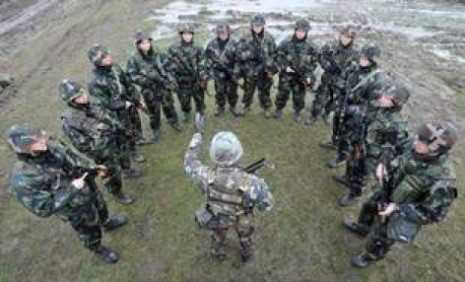
In six days, we were able to build a new bridge to replace the one that had been swept away by the red sludge spill. Firstly, the new bridge fits into the environment. Secondly, it was our gift so we had to construct it during the period assigned for training. Thirdly, it has a substantial load-bearing capacity so it will serve the village for a long time. Our helicopters transported the injured villagers to Budapest. With the help of their night vision goggles (NVG), our helicopter pilots noticed that the northern bank of the red sludge reservoir had cracks on it again. They issued an alert, which was followed by a meeting of the emergency management committee, chaired by the Prime Minister. At midnight, I telephoned Gen. Dr. Tibor Benkő, Chief of the MoD Defence Staff to inform him of the danger of the wall collapsing, in which case another 500,000 cubic metres of red sludge would have gushed onto the village. Until 6:00 am, which was when we got there with the Prime Minister, there were so many military vehicles, personnel and items of equipment on call in the area that we could have evacuated 3,000 people in a single operation. Fortunately, Devecser did not have to be evacuated, only Kolontár did, and that evacuation was completed in an hour. The professional performance of the HDF personnel must be recognized in a number of ways, so I decided to introduce a new medal the Service Sign for Disaster Relief, with identical engravings on the front side and pictures referring to a current industrial or natural disaster on the reverse side. The personnel of the HDF participating in the disaster response operations following the red sludge spill were decorated with this medal in Budapest and Győr in early December, while a further 5,000 or so soldiers received commendations for the flood relief operations carried out in early summer."
“At the Lisbon Summit NATO adopted a new strategy. The relations between the Alliance and Russia are changing and NATO has pledged to withdrew its troops from Afghanistan by 2014.What role will the Hungarian Defence Forces play in these changes, and how will these events transform our forces?"
“The Republic of Hungary and its Defence Forces are committed members of the North Atlantic Treaty Organization, so their points of view change in line with those of their allies in various issues. The core documents of an alliance, such as NATO’s Strategic Concept, have to be revised from time to time. The previous one was drawn up in 1999, and many things have changed since then. After 9/11, the threat of terrorism and the fight against it have become priorities for NATO. I should add the issues regarding energy security – back in 1999, they did not even get a mention in the document because at that time this kind of problem had not arisen. Similarly, the issue of cyber defence was not around a decade ago. Recently some successful cyber attacks were carried out against state-level systems of military command in Estonia, Iran, and Georgia, so we need to recognize that this development has led to the emergence of a new theater of war and probably marks the beginning of a new chapter in military history, the dawn of a new way of fighting .
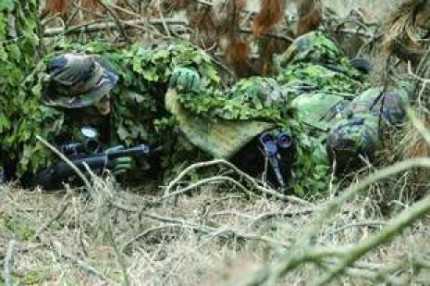
Turning to the situation in Afghanistan, the ISAF mission was launched nearly ten years ago and we are still not at the end of the road. We can reach our goal only if the legal Afghan government, as the representative of the Afghan people, is capable of maintaining security and the rule of law in the entire country by drawing on our assistance in training and in other fields as well as by using its own armed forces and police. This is the objective, this is what we must achieve, but we still have a long way to go as we have to admit that the security situation has deteriorated considerably, especially in the area of operations (AO) in the northern provinces where the Hungarian troops are deployed. In early summer, when I visited them for the first time, troops from 47 countries from all over the world were participating in the ISAF mission, which means that in addition to the NATO member states several Contact Countries were also involved. These days this number is even higher, which shows that the nations of the world are increasingly committed to participating in this mission. We are growing in number. The UN Secretary-General also attended the Lisbon Summit. In his speech, he reminded the leaders of the world again that this operation is being conducted under a UN mandate. In other words, the United Nations Organization has authorized every participating state – the entire international community if you like – to try to turn Afghanistan, a country that is currently a safe haven of terrorism, drug production and international crime, into a peaceful state that respects human rights and life."
“You need three things to wage a war: money, money and money. The same applies to peace. An extra 8.8 per cent has been earmarked in the 2011 budget for the Hungarian Defence Forces, which amounts to HUF 22.3 billion. What will be the priorities of the Ministry of Defence in allocating this increased budget?"
“This money could be spent on a huge number of projects. This sum, which is 8.8 times higher than what we received last year, is still only a fraction of what we need. Therefore we have no reason at all to celebrate the increased budget. We should be pleased to see that the leaders of the country, after many years of regular budget cuts, manpower reductions and downsizing , have now made a gesture by increasing the defence budget in this way. This gesture recognizes the importance of the national defence sector, and within that, the Hungarian Defence Forces as the main recipient. However, this increased funding will not be enough to make up for the shortfalls overnight – shortfalls that have accumulated over a number of years. All we can do is lay the foundations because there is a great demand in every field – we do not have enough personnel, equipment, weapons, materiel and stockpiles. There is an urgent need for accommodation, new properties and renovation. We are trying to allocate a little more to every field.
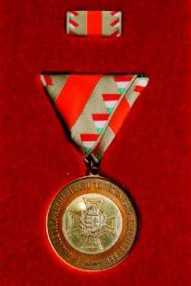
The top priority is always the military personnel. We are increasing the manpower of the Hungarian Defence Forces by 900, but based on the tables of organization and equipment (TOE) we are so short-staffed that we need a further 5,000 servicemen to hold different TOE positions. This means we have 5,000 people too few to carry out tasks that are constantly increasing rather than decreasing in number. The new tax system will provide significant extra income for many service members who have families with children, but it would be disadvantageous for certain categories of personnel by whom I mean mainly childless soldiers in some lower salary bracket. Thus the government has decided to pay compensation to those who might possibly be worse off due to their salary or family status. It can be said that that nobody will lose a single forint in the new tax system – actually, a lot of people will have considerably more money on their pay check. This balanced and fair tax system is going to honor the sacrifices made by raising children and undertaking increased workloads in the interest of the community."
“To what extent can you offer new perspectives and build a military career path on new foundations? How sure can a young man be that if he devotes his life to pursuing this career he will be able to build a secure future for himself?"
“We are making substantial efforts to set his mind at ease over that, since this is the only way to make progress. Soldiering is neither a profession nor a skill. It is one of the most important and most fundamental vocations. The most important function of the state is to ensure defence against attack from outside. This can be achieved by certain political, diplomatic and other ways and means but one precondition is that the state should have, maintain and develop strong armed forces. Those states that are unable to run their own military, no matter how superb their educational policies may be, are building on sand.
In order to be able to build our national defence on solid foundations, we need soldiers who are freed as far as possible from daily problems and uncertainties. We need our soldiers to receive the remuneration and moral respect they deserve and, equally importantly, to live in assured circumstances. They should live with the peace of mind that comes from being able to envisage their career model. They should know what lies ahead of them. They should be fully aware of opportunities for rising through the ranks, of new vistas that will open up for them and of the rewards they can certainly count on if they study, serve well and always do their best. This is the substance of a career path model that we are working on. We will propose this model for discussion in the spring and introduce it to the soldiers. I have set March 15 as the deadline for my colleagues, which means they will have to work out the model in detail by that date. Following that, in 2011, we will consider every suggestion and opinion and draw up a set of rules for the model to come into force as of January 1, 2012. In contrast to today’s conditions of military service that are often uncertain and unpredictable, and from which so many people suffer and about which they keep complaining, this model will guarantee every service member an absolutely assured, clear and settled career path."
“What you have just told us reveals that the planned changes will affect many fields in the Hungarian Defence Forces. Of these, media attention has focused on the establishment of the reserve system. By the time this interview is published, we will be seeing reservists on guard duty at the gates of many military installations."
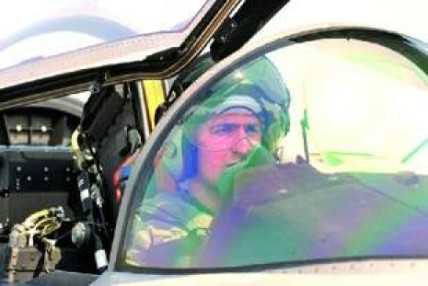
The new reserve system consists of four main elements. There are reservists who can be called up to perform duties in peacetime. They may be divided into two groups: one is the volunteer defence reserve corps, who are the personnel that had received comprehensive infantry training and taken the oath of military service. They will be mostly tasked with the guarding and protection of military compounds. That is why the employees of various security firms have disappeared from the gates of the barracks. All military installations in use will be guarded and protected by Hungarian soldiers. Obviously, there are some abandoned shooting ranges, depots and other facilities where a civilian security guard will suffice in the future too, but there is an anomaly in that the organization responsible for guarding and defending the entire country cannot even guard itself but rather outsources this work to various enterprises! Well, we have put an end to this state of affairs. These enterprises will be replaced by volunteer defence reservists, who are employed by an MoD firm. They will perform these guard and security duties as their main occupation but they will carry them out as reservists equipped with arms and dressed in battle dress uniforms (BDU). This involves some 2,000 persons, many of whom have already signed an agreement with us and whose training is in progress.
The second subcategory comprises volunteer operational reservists. They will be deployable to execute military tasks in the classic sense of the term, ranging from host nation support to the protection of infrastructure to holding regular positions in the military. Unlike other, previously mentioned corps, members of this personnel category do not pursue their main occupation within the system of national defence and the Hungarian Defence Forces, since students, civil servants, teachers, lorry drivers and masons can also choose this career opportunity. We will sign an agreement with them and their employers on the terms of service, working hours and remuneration of these individuals contributing to the Hungarian Defence Forces. In this case the most important target group must be the circle of former enlisted and professional soldiers. There are many thousands of people that we allowed to leave the system , including many enlisted soldiers with several years of service or professional soldiers with 25 years of active duty , and no one asked them, ‘My dear friend, wouldn’t you like to stay as a reservist? You are trained, have all the skills and are experienced, besides which, taxpayers have spent a lot of money on the training that enabled you to acquire this knowledge.’ Now we will ask them if they would like to join the HDF again. Naturally, they will receive a certain salary every year for being on standby, and when they are called in for training or report for duty, they will receive the remuneration that our regulations specify in the relevant pay grade. We will also come to an agreement with their employees so that they allow them to leave their jobs and reemploy them after the completion of their reservist service. We must have these employers recognize that these members of their staff serve the country as reservists.
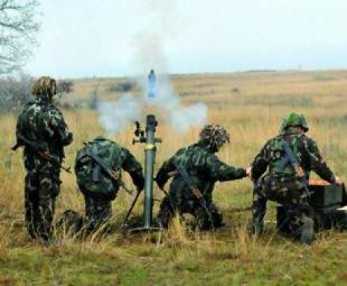
We definitely count on the employees in public services and believe that their reservist status will be an advantage for them in finding jobs, gaining promotions or pursuing further studies. The reason is that they agree to do extra service for the same community in the interests of which they are working in their civilian life. The same applies to a village administrator, a teacher or a doctor.
Reservists who can be called up in a period of preventive readiness or emergency form an important element of the reserve system, as compulsory military service was suspended in 2004 only for peacetime. This means that it would come into effect in wartime again and would involve the call-up of trained reservists as well as of untrained men liable to do military service, whose earlier designation was that of “supplementary reservists". There would probably be no need to call them up, but since we are talking about the system in its entirety, we must mention all four categories.
We should never forget that the laws of armies were written in blood. This is an old truth the violation of which will always lead to massive bloodshed. The most fundamental principle of military science is that there can be no armed forces without reserves. That would be unimaginable. Material and personnel reserves are equally essential. Unfortunately, the Hungarian Defence Forces lack both of these. This means that professional soldiers serving with the HDF these days will not by any means be put at a disadvantage with the introduction of the reserve force. This new capability will contribute to the fulfillment of their vocation and will enable them to pursue it even more professionally."
“Everyone carries the field marshal’s baton in his bag, but it takes a long time to be promoted to one-star general. The most important aspect of replacement is that of education, ie.the training of NCOs and officers. What are the future plans of the Ministry of Defence in this area?"
“During our conversation we have already touched on the huge challenges the Hungarian Defence Forces face in terms of materiel, equipment and weaponry. Nevertheless, they are world-class in one area, and that is the quality of their personnel. Wherever I go around the world, everybody speaks very highly of our excellently trained, superb officer corps, the non-commissioned officers and the enlisted personnel – and I am not exaggerating. I have been told everywhere that Hungarian soldiers can be relied on. Perhaps their uniforms are not entirely modern and they do not have such state-of-the-art weapon systems as the troops of some larger NATO member states, but as colleagues, comrades and experts they are among the best . Therefore, in saying that education, training and doctrine should be improved we are not implying that we have a big problem here. We only mean that there are possibilities, that we have some potential which, provided we work it out in detail and make good use of it, will enable us to achieve even higher quality standards. That is why, bearing in mind the interests of the Hungarian state , the government has decided to found a new public service university by merging the Police Officers’ College, the Zrínyi Miklós Zrínyi National Defence University (ZMNDU) and the Public Administration Faculty of the Corvinus University. This will be a new institution, an elite school that is responsible for educating and training everyone working in the service of the public, including soldiers, policemen, civil servants, secret agents and firemen , possibly within a uniform one-year basic training program followed by specialization. This training program is to be run in the same alma mater, with the same spirit of loyalty to the homeland.
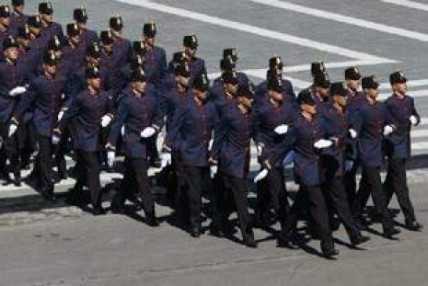
While we are being integrated into the new university system together with other branches of public service, we are also differentiating ourselves in a natural way. That is why we have formed the Ludovika Battalion of the Hungarian Defence Forces. Made up of officer cadets, this new 600-strong military organization will provide the system of officer training with a real and traditional framework, as this is not only a matter of education but rather one of instilling certain values. In contrast with the somewhat , let me put it this way , liberal practice that characterized the ZMNDU for some years, this new organization will provide future officers with a strict and orderly framework for soldiering , and this is only as it should be, as they have joined the armed forces to become soldiers. Well, from now on, they will live as soldiers from day one and likewise will pursue their studies as soldiers. While we are merging into a larger unit and so contributing to the development of a new quality we are also retaining and strengthening our special characteristics.
Photos: Veronika Dévényi, Mária Krasznai-Nehrebeczky, Tünde Rácz and László Tóth